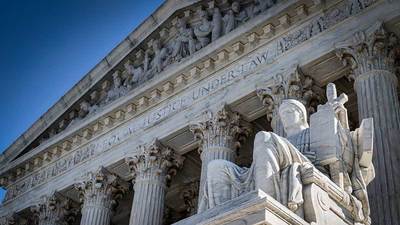ND Law faculty members file three amicus briefs in Dobbs v. Jackson Women’s Health Organization

Notre Dame Law School’s faculty contributed to three amicus briefs in the upcoming Supreme Court case Dobbs v. Jackson Women’s Health Organization.
- O. Carter Snead, a professor of law at Notre Dame Law School and director of the de Nicola Center for Ethics and Culture, filed an amicus brief with Mary Ann Glendon, the Learned Hand Professor of Law, emerita, at Harvard Law School.
- Paul J. Schierl/Fort Howard Corporation Professor of Law Richard Garnett, who directs the Law School’s Program on Church, State & Society, co-authored an amicus brief with the law firm Cooper & Kirk in Washington, D.C. Their brief was submitted by the Washington, D.C.-based Ethics and Public Policy Center.
- Biolchini Family Professor of Law Emeritus John Finnis co-authored an amicus brief with Robert P. George, the McCormick Professor of Jurisprudence at Princeton University.
Dobbs v. Jackson Women’s Health Organization — which questions if the Mississippi law prohibiting elective abortion after 15 weeks of gestation is constitutional — is widely viewed as the most important abortion law case that the Supreme Court has considered since Roe v. Wade in 1973 and Planned Parenthood v. Casey in 1992.
All three briefs submitted by Notre Dame Law School faculty argue that Mississippi’s law is constitutional, and Roe v. Wade and Planned Parenthood v. Casey should be overturned.
“The Court’s abortion jurisprudence is completely untethered from the Constitution’s text, history, and tradition,” Snead and Glendon note in their brief. “It has imposed an extreme, incoherent, unworkable, and antidemocratic legal regime for abortion on the nation for several decades (pursuant to constantly shifting rules, standards, and rationales),” and thus principles of stare decisis warrant overruling these precedents. Also, they argue, “The Court’s abortion jurisprudence grafted onto the Constitution a vision of what it means to be and flourish as a human being that isolates mother and child, pitting them against one another in a narrative of zero-sum conflict among strangers, depriving them of much needed sources of protection, support and care.”
Garnett and his co-authors also argue that stare decisis considerations favor overturning Roe v. Wade and Planned Parenthood v. Casey.
“As a matter of the Constitution’s text and history, it is no secret that Roe is not just wrong but grievously so. Roe was roundly criticized as wrong the day it was decided, it has been robustly opposed both within and outside the Court ever since, and no sitting Justice has defended the merits of its actual reasoning,” Garnett and his co-authors state in their brief.
“By the narrowest of margins, this Court in Planned Parenthood v. Casey (1992), refused to overrule Roe — not because it thought Roe was correct, but because it thought Roe must endure as a matter of stare decisis. But 30 years later it has become clear that Casey, too, was egregiously wrong, for each one of the stare decisis factors cited by Casey itself supports Roe’s repudiation.”
Finnis and George, however, argue that the Court should not hand the whole issue back to the States. Roe erred not only by asserting a Due Process privacy right to abortion but also by denying that the unborn are persons, both in reality and within the original public meaning of “any person” in the 14th Amendment’s Equal Protection Clause. Their brief argues that Mississippi is not only entitled but also constitutionally required to prohibit elective abortion at any stage of gestation.